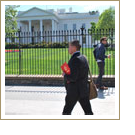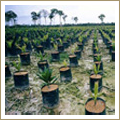
|
View this newsletter in your browser. |

|
|
|
Research Highlights |
|
|
People Spotlight |
|
|
Program Updates |
|
|
Calendar of Upcoming Events |
|
May
14 |
Energy Seminar |
|
"It Pays to Do the Right Thing: Incentive Mechanisms for Societal Networks"
Speaker: Balaji Prabhakar, Electrical Engineering and Computer Science, Stanford. » Read more … |
|
|
May
17 |
Boething Lecture |
|
"Big trees, big problems: landscape traps threaten the world's tallest trees"
Speaker: David Lindenmayer, Professor, The Fenner School of Environment and Society at Australian National University College of Medicine, Biology and Environment. » Read more … |
|
|
May
21 |
Energy Seminar |
|
"Unlocking the Benefits of Active Customer Participation in Wholesale Electricity Markets"
Speaker: Frank Wolak, the Program on Sustainable Energy Development, Stanford. » Read more … |
|
|
May
24 |
Environmental Forum |
|
Speaker:
Benjamin Santer, Research Scientist, Program for Climate Model Diagnosis and Intercomparison.
» Read more … |
|
|
May
31 |
Environmental Forum |
|
Speaker:
Scott Doney, Senior Scientist, Department of Marine Chemistry and Geochemistry.
» Read more … |
|
|
June
4 |
Energy Seminar |
|
"Saving the World and Having a Job: Distributed Solar - Exciting Challenges & Rapid Growth"
Speaker: Shawn Kerrigan, Locus Energy » Read more … |
|
Water, Water, Everywhere?Water is a national security issue, but don't take our word for it.A recent U.S. State Department study predicts water shortages, poor water quality and floods will increase the risk of instability, state failure and exacerbated regional tensions within the next 20 years. A lack of adequate freshwater will also threaten global food markets and economic growth. Stanford Woods Institute for the Environment researchers are finding real conservation and management solutions now with potentially life-saving data on water-fetching in sub-Saharan Africa and valuable insight into western water management. Read our redesigned newsletter below for more about these and other developments. Also, keep an eye out for our new in-depth quarterly research digest set to launch this summer. Sincerely, |
||
|
Debbie Drake Dunne
|
Jeffrey R. Koseff
|
Barton H. Thompson, Jr.
|
|
|

Water-Fetching:
|

Climate Change and Corn Price FluctuationsIn the next three decades, America's number one crop could see increased price volatility due to climate change, according to a new study by Stanford Woods Institute Fellow Noah Diffenbaugh and Purdue University Distinguished Professor of Agricultural Economics Thomas Hertel. The effect of more frequent climate change-induced heat waves is likely to have far greater influence on the volatility of corn prices than factors such as oil prices, trade policies and government biofuel mandates, the researchers found. The study, published in the journal Nature Climate Change, shows for the first time climate change's outsized influence on year-to-year swings in grain prices. It finds that when climate change is coupled with federal mandates for biofuel production, corn price volatility could increase sharply over the period from 2020 to 2040. It also posits that, unless corn farmers increase their crops' heat tolerance by as much as 6 degrees Fahrenheit, areas of high corn production may have to move to the Canadian border in order to avoid excessive heat extremes. |

Support for Climate Change Action DipsAmericans' support for government action on global warming remains high but has dropped during the past two years, according to a new survey by Stanford Woods Institute Senior Fellow Jon Krosnick in collaboration with Ipsos Public Affairs. Cooler-than-average weather and political rhetoric appear to have influenced the shift, but economics doesn't appear to have played a role. Krosnick's study shows that support for a range of climate change mediation dropped from 72 percent in 2010 to 62 percent in 2012. The shift may have been influenced by a dip in worldwide average temperatures (2011 tied for the coolest of the last 11 years) and anti-climate science rhetoric by Republican Party Presidential candidates, the study finds. |
|
|

Natural Capital Project Director Speaks at World Oceans SummitMary Ruckelshaus, managing director of the Natural Capital Project, flew to Singapore in February to lead a briefing at the Economist magazine's World Oceans Summit. The summit brought together more than 200 global leaders from governments, businesses, international organizations, NGOs, think-tanks and academia. Ruckelshaus explained to summit-goers that assessing the impact of human activity on oceans requires non-market valuations such as the protective services of reefs and mangroves, or the importance of the seas to many cultures. An explicit valuation of ocean ecosystems and biodiversity could be a powerful tool for decision-makers framing conservation and stewardship issues alongside standard economic measures of value-and serve to minimize mismanagement and misuse, Ruckelshaus said. |

Tough Enough?: Steve Palumbi's Search for the World's Strongest CoralsMost people try to avoid getting into hot water. Stanford Woods Institute Senior Fellow Steve Palumbi went across the world to get into it. Palumbi - a member of the Center for Ocean Solutions management committee and Director of the Hopkins Marine Station - went to Ofu Island in American Samoa and Rarotonga and Aitutaki in the Cook Islands to look at how shallow-reef corals there survive unusually hot waters and what makes them so tough on a molecular genetic level. With this knowledge, Palumbi hopes to inform policymakers how to more effectively protect corals, the source of aquaculture, protein and storm protection for about 1 billion people worldwide. Palumbi and his team used stress tanks, two-gallon coolers jerry-rigged with fans, floodlights and heat sticks, to measure coral beaching at precise temperatures. Palumbi envisions the low-tech tanks as valuable tools that can be used easily by local researchers in remote areas. "Right now we have this incredible opportunity to forge a collaboration between scientists and politicians," Palumbi said. "If the scientific community can find the world's strongest corals, will the political community agree to protect them?" |

Elizabeth Hadly Named to Endowed Chair
Stanford Woods Institute Senior Fellow Elizabeth Hadly was appointed the Paul S. and Billie Achilles Professor in Environmental Biology on Elizabeth Hadly is a professor of biology and of geological and environmental sciences at Stanford. She first became interested in her field after exploring the Smithsonian Institution and wild lands in the West as a child. Following her undergraduate and graduate studies, she conducted extensive research throughout North and South America on the ecology and evolution of vertebrates. She is especially interested in the biogeographic history of mammals around the world, most recently working in India and Costa Rica. Hadly studies the evolution and ecology of vertebrates and the influence of the Holocene warming on the population biology of vertebrates, community assembly and history of living organisms in North and South America. |
|
|

Water in the West Uncommon DialogueWhat can scientists do to help groundwater managers? That was the underlying question at an April 20 Uncommon Dialogue hosted by the Stanford Woods Institute's Water in the West Program. The event brought together groundwater managers from across California and researchers from Stanford, UC Davis, the University of Idaho, the Idaho Department of Water Resources, the U.S. Geological Survey and the University of Calgary. The disparate stakeholders focused on forging partnerships to develop practical solutions using the latest in groundwater technology. They discussed recent research and swapped management lessons learned. Going forward, the Water in the West Program is working to match managers and researchers based on technology needs and research projects. |

Basic Training in the Nation's CapitalTwo-dozen Stanford PhD students and postdoctoral scholars from a range of disciplines recently traded sandals for suits and books for bills. They were visiting Washington, D.C. as part of an intensive "boot camp" organized by the Stanford Woods Institute that promised an in-the-trenches perspective on advancing research through policy development, public service careers and network building. The boot camp is part of Stanford Woods Institute's Rising Environmental Leaders Program, which helps students hone their leadership and communications skills to maximize the impact of their research. During the week-long boot camp, participants listened to speakers from various agencies and organizations, sat in on hearings and navigated the city to meet with movers and shakers in their research fields. |

Biofuels: The Changing Nature of Agricultural DemandIn the first decade of the 21st Century, global production of ethanol and biodiesel increased nearly tenfold. If that trend continues, says Rosamond Naylor, director of the Center on Food Security and the Environment, national biofuels policies will have an increasingly powerful impact on food prices, food security, energy security, and rural incomes in the developing world. During an April symposium, Naylor addressed the role of biofuels in global food price volatility and the implications of biofuels development in rural Africa and Asia. Although she acknowledged that global income and population growth have contributed to increased demand for biofuels, she also emphasized "the unbelievable dominance of policy" in driving current trends. Policies that fix demand for corn from the ethanol market, she explained, have a destabilizing effect on corn prices, especially in the face of supply shortages. |
Find Us Elsewhere on the Web


|
The Stanford Woods Institute monthly newsletter can also be found
online. For more info about the Stanford Woods Institute, visit
woods.stanford.edu, or email us at
environment@stanford.edu.
To unsubscibe from this newsletter please send your request to environment@stanford.edu. Stanford Woods Institute for the Environment Jerry Yang & Akiko Yamazaki Environment & Energy Building - MC 4205 473 Via Ortega Stanford, CA 94305 |